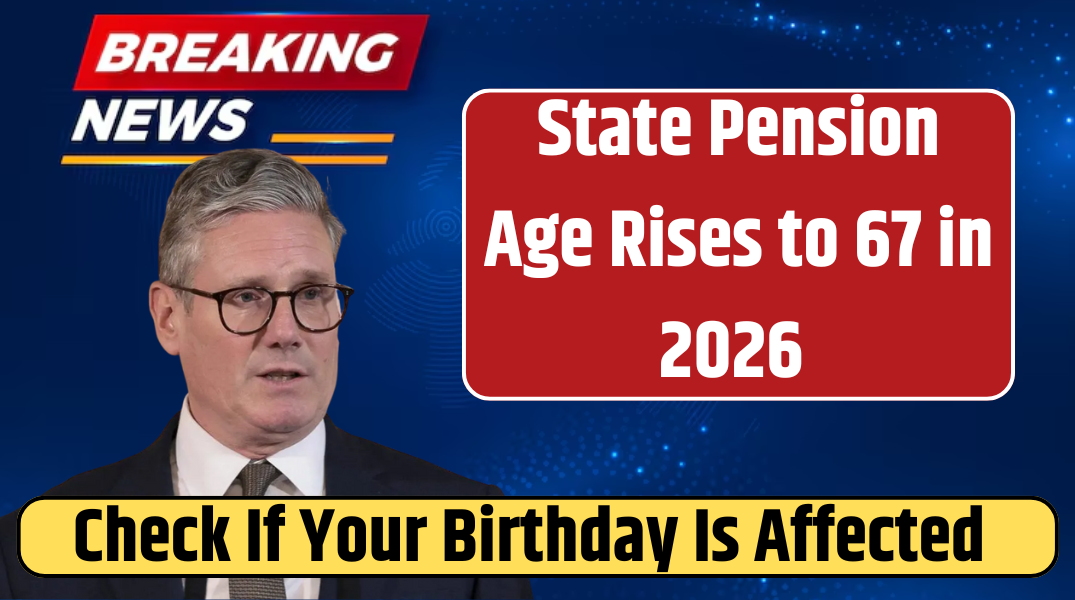Millions of people across the UK are set to experience a major change in when they can claim their State Pension. Between 2026 and 2028, the official State Pension age will gradually rise from 66 to 67, affecting both men and women equally. Here’s a comprehensive guide to what’s changing, who’s affected, and how to prepare.
Who Will Be Affected by the New State Pension Age?
This phased increase affects people born between April 6, 1960 and March 5, 1961:
-
If you were born on or after April 6, 1960, you’ll reach State Pension age of 66 on May 6, 2026.
-
If you were born on or before March 5, 1961, you’ll now receive your pension at 67, starting February 5, 2028.
-
Those with birthdays in between will have their pension age set somewhere between 66 and 67, depending on their exact date of birth.
👉 Note: This change applies uniformly across England, Scotland, Wales, and Northern Ireland.
Why Is the Pension Age Rising?
The UK government reviews the State Pension age periodically to reflect longer life expectancy and to manage the cost of public pensions. The goal is to maintain a balance between how long people work and how long they receive retirement benefits.
On average, people are living longer, and this means more years of retirement. To make the system sustainable, the government is gradually increasing the age at which people can start claiming.
Additionally, a further increase to age 68 is planned between 2044 and 2046, but this timeline may be brought forward depending on future reviews.
Also Read – UK Workers to Receive £29,000 Boost Under New Pensions Bill
How Much Could You Receive?
As of April 2025, here’s what pensioners can expect:
-
Full new State Pension: £230.25 per week (≈ £11,973/year)
-
Full basic State Pension: £176.45 per week (≈ £9,175/year)
These amounts are protected by the “triple lock”—meaning they’ll increase every year by whichever is highest of:
-
Average earnings growth
-
Inflation
-
2.5%
Projections suggest increases between 2.5% and 4.1% in the coming years.
How to Check When You’ll Get Your Pension
Use the UK Government’s State Pension Age Checker to:
-
Confirm your exact retirement age
-
See when you qualify for Pension Credit
-
Check eligibility for free bus travel (age 60 in Scotland)
📬 The Department for Work and Pensions (DWP) will send out notification letters in advance to anyone impacted by the age changes.
National Insurance Contributions: Are You on Track?
To qualify for any State Pension, you need:
-
At least 10 years of National Insurance (NI) contributions
-
35 qualifying years to receive the full amount
Missed years? You might be able to fill the gaps by making voluntary NI contributions—but always check with HMRC before paying, as not all gaps need to be filled.
Will You Be Taxed on Your Pension?
-
The personal tax-free allowance will remain at £12,570 for 2025/26.
-
If the State Pension is your only source of income, you won’t pay tax.
-
But if you have other income (e.g., private pensions, part-time work, or investments), you might need to pay income tax on the combined total.
-
Any tax due on the 2025/26 uplift could arrive in July 2026.
Interesting Add-on: How UK Pension Ages Compare Globally
The UK isn’t alone in pushing back retirement ages. Here’s how we compare:
-
France: Recently raised to 64
-
Germany: Gradually moving to 67
-
USA: Full retirement age is 66–67, depending on birth year
-
Japan: Considering a push to 70, already has some of the longest working lives
Also Read – DWP Confirms £250 Cost of Living Payments Arriving in July
Frequently Asked Questions (FAQs)
Q1: Will the pension age rise again in the future?
A: Yes, another increase to age 68 is currently scheduled between 2044 and 2046, but this timeline may change depending on life expectancy and policy decisions.
Q2: How do I know how much pension I’ll get?
A: Use the UK government’s State Pension Forecast tool to view your current contributions and estimate your retirement income.
Q3: Can I still retire early?
A: Yes, but you won’t receive the State Pension until your official pension age. You’d need to rely on private savings or workplace pensions.
Q4: What if I have fewer than 35 NI years?
A: You’ll get a reduced pension based on how many qualifying years you have. If you have less than 10 years, you won’t qualify unless special exceptions apply (e.g., working abroad and paying into another country’s system).
Q5: How can I add more NI years?
A: You can pay voluntary contributions to plug missing years, but always use the NI record checker and speak to HMRC to confirm it’s worth doing.
Final Thought
The upcoming change to the State Pension age is a significant shift for millions of UK citizens. While it may delay retirement plans for some, the longer working years are a response to longer, healthier lives.
💡 Planning ahead, understanding your entitlements, and making sure your National Insurance record is in order are the best steps you can take now.












